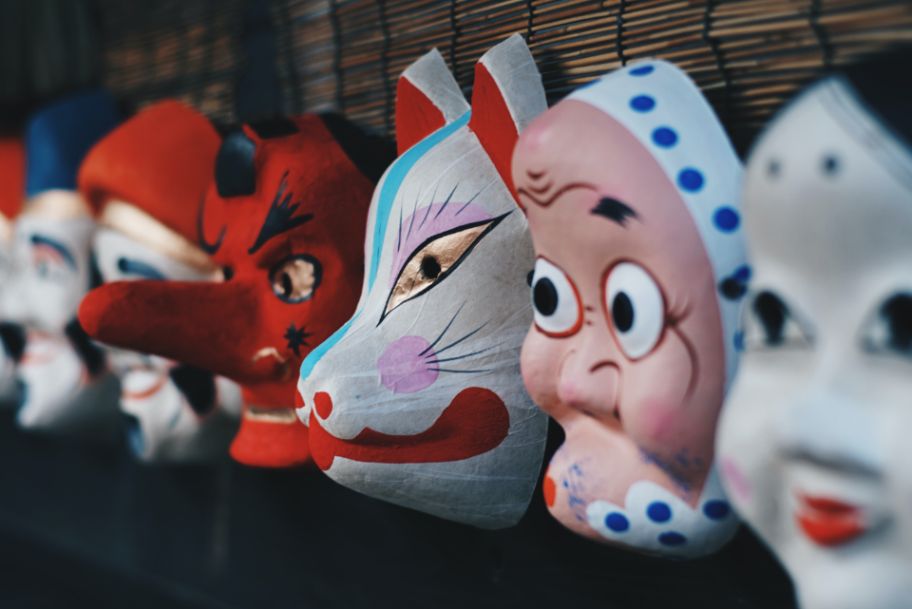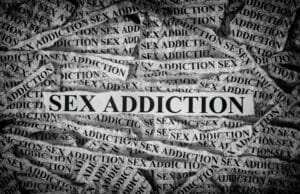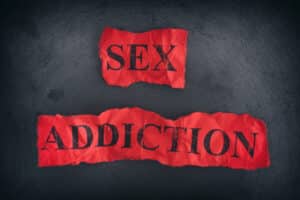
I grew up in a household and a religious culture where it was frowned upon to show weaknesses and vulnerabilities. I recall from a young age that I never wanted my parents, friends, or church leaders to see me be anything but perfect. The consequences of imperfection seemed very scary to me and I didn’t want to experience those consequences. So I started learning how to deceive others into seeing only the parts of me that I wanted them to see. I started to hide those aspects of myself that were “shameful” according to what I was taught was shameful.
In other words, I learned to wear a mask. Or, more accurately, I wore several masks depending on the situation. When I was at home I wore one mask and when I was at work I wore a different one. I had a mask for church, a mask for friends, a mask for parties and a mask for sporting events. The masks were almost endless.
I subconsciously picked each mask based on past experiences I had while growing up in a culture that values certain things. I decided from a young age that I wanted to be a lawyer when I grew up because that would portray an air of prestige, intelligence, success and respectability. I played sports and went to the gym because that showed people that I was athletic and shaped my body into what I thought the world valued. I wore the type of clothes and drove the type of car that I believed would make me look cooler.
Each of these masks was just a different method of showing the outside world what I wanted them to see. I also believed that they prevented people from seeing the parts of me that I wanted to keep hidden, like my addiction. I believed that if anyone saw the real me – the one who was addicted to porn, the one who was sad and depressed, and felt like he was unlovable or “less than” others – that I would be rejected. I had to wear these masks to survive in a world that I thought was ready to cast me out the second my true self came to light.
Eventually The Masks Have To Come Off
Wearing these kinds of psychological masks is an exhausting way of living life. I felt like a performer who could never leave the stage because I didn’t want them to see what was behind the curtain. Most addicts live life this way, because addiction is only able to thrive in the dark. But trying to always keep my masks straight and remember which one to wear in each situation wore me down. I started to feel overwhelming conflict burning me up on the inside.
Then I hit rock bottom. The strain of living a double life was just too much for me. The pain of living in my addiction became too great.
The beauty of hitting rock bottom is that it becomes very easy to look at your life and become open to other people showing you what’s not working for you. When I finally went to Desert Solace for porn addiction rehab, I sat down with one of the therapists who showed me that it was okay to love myself, faults and all. She taught me about the masks I wore and challenged me to let go of them. She helped me feel safe portraying the true me to the world without fear of rejection. What I saw was that the love and acceptance that I was always seeking by wearing these masks was actually being kept from me because the masks were preventing people from loving the true and authentic me.
Living life authentically felt like freedom. I no longer felt the need to portray myself in a certain way to different people. I was the same person in every situation whether it was at work, at home or at church. Part of that came from being open with other people about my recovery from porn addiction. That was the part of myself that I always fought hardest to keep others from seeing, so when that was out in the open it was way easier to be open about all of my other faults and failings. I stopped hiding.
Keeping the Masks Off In Recovery
I’ve been in recovery for almost four years now and I’ve since learned that I get to be vigilant about keeping those masks off. It’s really easy for your ego to step back in and convince you that you have to hide your weaknesses.
There are several ways to do this and I’ll point out just a few:
1. Awareness
Awareness is always step one when it comes to any process of self-mastery. Because if we lack awareness of what’s going on inside ourselves, how will we ever be able to address it from a place of power?
Before getting help and a lot of therapy at a sexual addiction treatment center, I never had any idea that I was constantly wearing a mask (or many masks). I also didn’t fully understand why that was a problem and why it was important to my recovery to drop the masks.
In other words, I lacked awareness. One thing we teach our clients at Desert Solace is to be constantly in touch with what’s going on inside yourself. Be aware of your emotions, your intentions, your mentality and your actions in every moment. If you can constantly maintain awareness, you will be able to see when you are sliding back into old patterns of using a mask to prevent others from seeing your true self.
Like any other skill, this is something that can be developed and gets easier over time. But, at least for me, it wasn’t easy and I still don’t feel like I’m even close to mastering it. The one thing that gives me comfort is that I feel like I’m on the right path and I am definitely way more comfortable without the masks now than I have ever been.
2. Self-Acceptance
The best way to drop your masks and keep them off is by learning to accept yourself for who you are. When you love yourself, faults and all, there’s really no need to worry about what other people think of you. They can think whatever they want, it doesn’t affect how you feel about yourself when you truly accept yourself.
It feels freeing to be able to be yourself around everybody and to recognize that if they reject you, it’s their own problem. They are the ones missing out on the love and connection that you have to offer.
This is obviously a principle that needs its own article, so I won’t go into the all the details of how we get to a place of self-acceptance. But I will say that for most addicts it involves a process of forgiveness that seems impossible to give yourself when you’ve been stuck in addiction for years.
Finding a way to forgive yourself for the things you’ve done in the past is a powerful way to find self-acceptance in your life.
3. Accountability
Accountability is a cornerstone principle of recovery. If you’re wondering what accountability means in the context of recovery, I think the best way to describe it is that it’s about taking personal responsibility for your choices each and every time.
In the recovery world we like to use the phrase, “Keeping my side of the street clean.” So when we make a mistake, we own it. When we get into a personal conflict with others, we recognize our part in the conflict and do our best to resolve it. This doesn’t mean we have to take responsibility for other people’s actions or take on blame that isn’t due. It’s about owning our actions and accepting the consequences of those actions.
For me, accountability means evaluating myself at the end of every day and reporting to my sponsor on how I did and looking at where I can do better. Being fully accountable to myself and my sponsor helps me to recognize situations where I may have put on a mask that I didn’t need. The more I do this the better I get at seeing these situations when they arise and proactively drop my masks so I show up more often as my true authentic self.
4. Rigorous Honesty
Another core principle of recovery that we teach in Desert Solace (which is also taught in 12-step communities) is rigorous honesty. What is rigorous honesty? Rigorous honesty just means being honest about the big things and the small things, wherever you are, and without regard for the consequences.
The addicted mind thrives in the gray areas of life, in a world that lacks clarity or agreement. Withholding information or “lying by omission” is a common mode of operation for addicts because it allows them the space to engage with their addiction without getting caught. It also allows them to gaslight others when they do get caught.
Many addicts have a crippling fear of being fully honest with others. They have learned a way of life that leads them to subconsciously believe that their survival depends on them being able to hide the truth. So the default mode for addicts, is to deceive others if they think there might be any negative reaction to the truth.
The masks that I described above are a big way in which addicts (and most people) hide from the truth. It’s a very subtle way of deceiving others into seeing you in a false light, because you aren’t showing them who you really are.
Practicing rigorous honest in my recovery has been a difficult learning process. One of my biggest fears is that others will see my imperfections. So when I (shockingly) make a mistake that shows I am imperfect, my impulsive reaction is to lie about it. This could be in a situation as simple as when I forget to grab something at the grocery store that my wife asked me to get. Instead of admitting that I forgot the eggs, my first impulse might be to say something like, “Oh, they were out of eggs.” Which is so stupid, because I know my wife would be understanding and forgive me for being human, but that’s how I’ve been conditioned my whole life.
So learning how to be rigorously honest is like retraining myself to change my default mode.
5. Surround Yourself with People Who Accept You
This seems like a no-brainer, whether you’re in recovery or not. Life is too short to spend your time around people who don’t accept you for who you are. Unfortunately, many of us spend a lot of our time in life trying to fit in with people we think are “cool” or “popular” without asking whether we even want to be around those people.
Going through addiction recovery and being honest with people about your story can be a great way to move on from friends who aren’t really true friends in the first place. There were a select few people who I told about my addiction and recovery who reacted negatively and distanced themselves from me. The blessing of that was that I knew that I didn’t need those people around me anyway.
My true friends were the ones who treated me no differently after learning about my addiction than they did before. In fact, some friends showed more love and kindness to me and often told me about their own struggles with addiction or other trials they’d gone through in their life. Those were the type of people I wanted in my life. Or, more accurately, those were the type of people I needed in my life if I wanted to continue to recover from addiction.
I also learned to create a strong recovery network of men who were struggling with pornography and sex addictions by attending regular 12-step meetings like Sexaholics Anonymous (SA), SA-Lifeline and the LDS church’s Addiction Recovery Program (ARP). It was still incredibly scary at first to go to these meetings, but once I started attending and listening to others share their stories and sharing my own, I realized that nobody was judging me and that I was in a safe place to be myself.
Being around people who I knew wouldn’t judge me, who showed nothing but love and acceptance even after learning about my addiction really helped me to let go of my masks. I didn’t need to put on a show anymore. I didn’t need the protection that I thought the masks offered me. Because there was nothing left to hide.
Why Is This Important to My Porn Addiction Recovery?
Something my sponsor has told me many times is, “We’re only as sick as our secrets.” It is impossible for addiction to thrive in someone who is living a true and authentic life. When you become honest with yourself and others about who you are, you’ll recognize that addiction has no place in your life.
It will probably take some good therapy and help from others, but you’ll find that once you get to a better place in your recovery, it is easier to drop the masks and be yourself. And that is true freedom.
Read More About Recovery From Pornography Addiction

Benefits of a Certified Sex Addiction Therapist
There are a number of fields where certified training for professionals is quite valuable to the people who utilize their services, and sex addiction therapists

Is Sex Addiction a Mental Illness? Key Considerations
There are several questions that often arise among those who deal with sex addiction or others close to them, and some of them revolve around

Why is Pornography So Addictive?
It’s common for those struggling with addiction or those close to them to wonder exactly how a given form of addiction can take such a

Is Sex Addiction Hereditary?
There are a number of questions that are common within the realm of sex addiction, and many of these surround the underlying causes that contribute

Impact of CSBD on Sex Addiction Recovery
There have been a few major events that have had a big impact on the world of sex addiction and pornography addiction recovery, and one

Signs and Symptoms of Sex Addiction
The ability to recognize signs of addiction is very important, whether for yourself or someone close to you, and the realm of sex addiction is